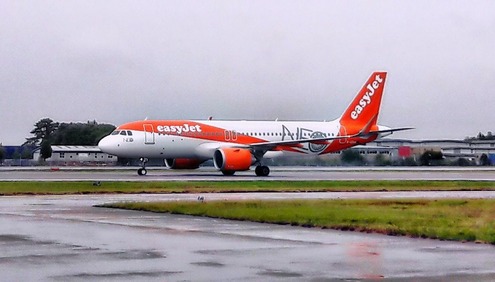In a trading statement for the three months ended 30 June 2022, easyJet has reported a group headline loss before tax of £114 million, which included a £133 million cost impact from disruption and a £36m loss from FX balance sheet revaluations. easyJet’s Q3 headline EBITDAR profit was £103 million compared to £313 million in Q3 FY19.
Total group revenue for the quarter ending 30 June 2022 increased to £1,755 million (Q3 FY21: £213 million). Passenger revenue increased to £1,152 million (Q3 FY21: £152 million) and ancillary revenue increased to £603 million (Q3 FY21: £61 million) primarily due to the increase in capacity flown.
Group headline loss before tax for the quarter ending 30 June 2022 was £114 million, a £204 million improvement compared to the £318 million loss in Q3 FY21. Included in the headline loss was a £36 million loss from balance sheet FX revaluations.
easyJet comments that its key areas of transformation continue to deliver, with Q3 financial performance improved despite increased operational costs. The airline’s Q4 load factors are booked slightly ahead of FY19, and it reports that step-changed ancillaries continuing to deliver with Q3 ancillary yield 55% above FY19.
easyJet holidays generated £16m profit in the quarter. easyJet is currently c.83% hedged for fuel in Q4 at c.US$705 per metric tonne
In Q3 easyJet flew 22 million passengers, more than seven times higher than the same period last year, representing 87% of FY19 capacity. Load factors continued to build over the quarter, reaching highs of 92% in June.
easyJet notes that despite the ramp up in demand and tight labour market, it “has operated 95% of its planned schedule in Q3”. The airline added that the removal of capacity in Q4 had “resulted in July operations to date being much improved” and that it was focused on “ensuring smooth operations this summer” that may include fine tuning its schedule.
Q4 is currently 71% booked, load factor slightly ahead of 2019 and sold ticket yield is 13% above FY19.
easyJet is seeing yields track positively through the first half of FY23, with October half-term currently booked in line with FY19 on capacity at 95% of FY19 levels.
Commenting, Johan Lundgren, easyJet Chief Executive said: "Delivering for customers this summer remains our highest priority. During the quarter we carried seven times more customers than the same time last year and operated 95% of our schedule. We have taken action to build the additional resilience needed this summer and the operation has now normalised.”
"Despite the loss this quarter due to the short-term disruption issues, the return to flying at scale has demonstrated that the strategic initiatives launched during the pandemic are delivering now and with more to come. This includes a step-change in ancillary yields, increasing 55% versus the same period in 2019, and a record profit of £16m generated in the quarter by easyJet holidays which is on track to serve 1.1 million customers in the full year.
"easyJet expects capacity to be c.90% of Q419 across our network of major European airports, with load factors targeted above 90%."
easyJet’s net debt was £0.2 billion (31 March 2022: £0.6 billion) including cash and cash equivalents and money market deposits of £3.9 billion.
During the third quarter easyJet won 18 daily slots (9 slot pairs) at Lisbon airport that will result in easyJet becoming the second largest airline at the airport. The additional capacity enabled by the new slots will be deployed starting in October.
easyJet currently expects capacity in Q4 to be c.90% of Q4'19 with load factors above 90%. easyJet's Q4 schedule is now 71% booked, 1ppt ahead of this point in FY19. Q4 sold ticket yield is currently 13% above FY19.
easyJet is currently c.83% hedged for fuel in Q4 of FY22 at c.$705 per metric tonne, c. 60% hedged for fuel in H1 of FY23 at c. $784 per metric tonne and c. 33% hedged for fuel in H2 of FY23 at c. $879 per metric tonne. The spot price on 22 July 2022 was around $1,090.

